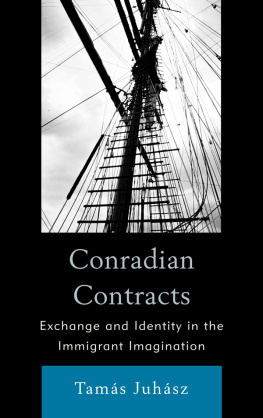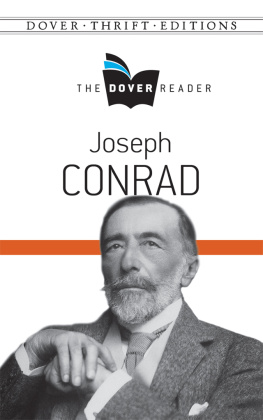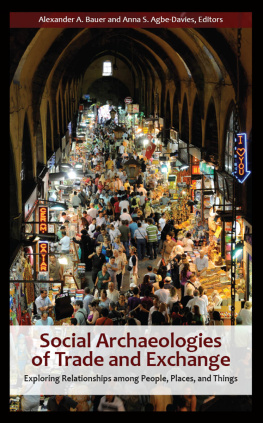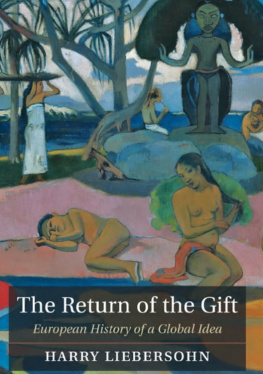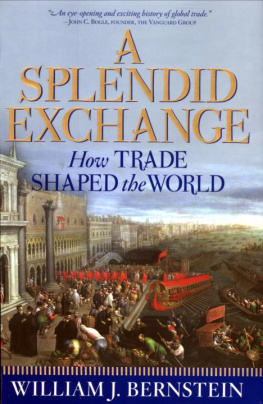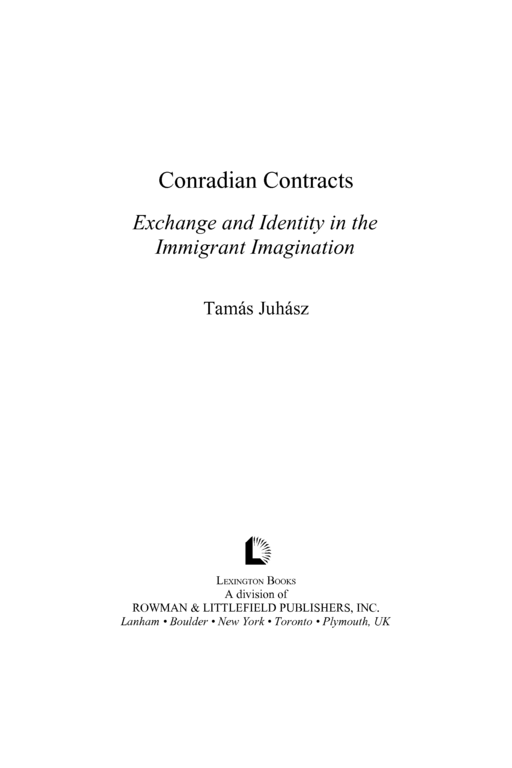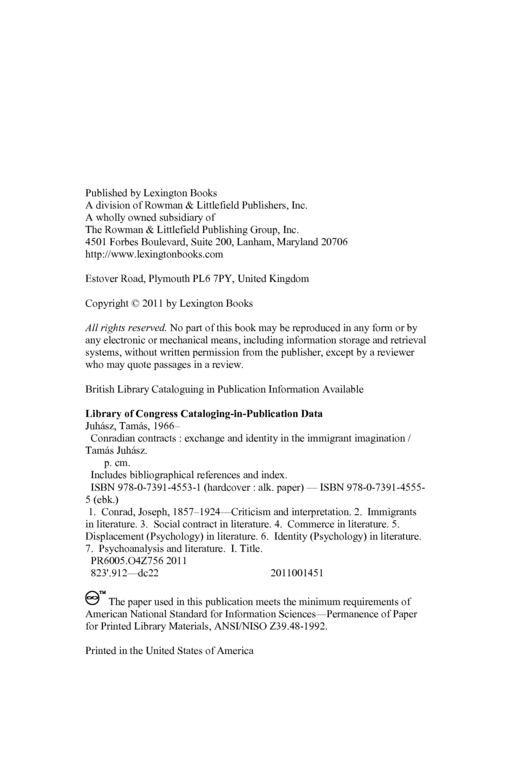Contents
Preface
Acknowledgments
Abbreviations
| 1 | Commerce and Return in Almayers Folly |
| 2 | Trans-Ports of Love: Exchange as Practice and Narrative |
| 3 | Never Keeping to Oneself: A Total Social Fact in Typhoon and The Secret Sharer |
| 4 | Paternal Discourse and Contractual Revision in Under Western Eyes |
| 5 | The Duel: Rules and Reciprocities; or Blows For Sheer Love |
| 6 | A Supreme Illusion: Acts of Recognition in The Secret Agent |
| 7 | Trade, Meaning and the Prospects of Self-Transformation in Lord Jim |
| 8 | The End of Potlatch: Gift and Prestige in Nostromo |
| 9 | Sympathy, Generosity and the Business of Womanhood in Chance |
| 10 | Conclusions and Words after Conrads |
Works Cited
Index
About the Author
Preface
Irritated by the late financial return on his artistic efforts, Joseph Conrad wrote the following to his friend Edward Garnett: If I had made money [...] I would be a baronet of the U.K. and provided both with a language and country ( CL 4: 108). According to this logic, if possessing assets leads to being accepted ( CL 1: 347), then being an outsider causes not only isolation but also failure in business. This idea is accurately expressed in a letter about the moderate commercial success of The Secret Agent . Comparing himself to Hardy, fellow author of equally tragic [...] and gloomily written, yet still quite marketable novels ( CL 4: 10), Conrad relates his own non-English origin to the fact of not being saleable (9): there is something in me that is unsympathetic to this general public [...] Foreignness I suppose (10; emphasis in original). He is displaced, and he perceives that his exilic background has much to do with his commercial standing.
This association between trade and social identity, which may appear in the above as merely accidental, is the subject matter of the present study. The above citations not only offer a very concise summing up of what I read as a central and permanent concern in the authors life and fiction, but also display markedly different logic. Whereas the first one shows that a given economic position can affect ones language and rank, the other demonstrates that social standing can impact a persons trading capacity. It is a link that manifests itself in Conrads correspondence in a number of forms and from a variety of angles. Just as in the letter to Garnett, which describes Winnies novel as having brought its author neither love nor promise of literary success (ibid.), the loss in question is not limited to money. Elsewhere, human relationships are couched in terms of valuable possessions and at yet other points, metaphors of business and other economies are endowed with a community-generating capacity. Thus, while Conrad uses metaphors such as the coin of sympathy ( CL 2: 140), friendly feelings [as] the clearest gains (63) or friendship contracted (ibid.), he is also prone to invert this logic and suggest that entering the right transactions can actually create an interpersonal relationship, or at least end the solitary artists isolation: I want to rush into print whereby my sentimentalism [...] shall be disclosed to the public gaze! ( CL 1: 347).
Focusing on what Conrad achieved in print, this book will examine the ways in which the novelists characters make comparable efforts to have their displaced selves recognized and accepted by the community from which they are barred. These efforts can be taken as broadly economic, but just as the concept of reward or compensation continues to transcend the merely financial, the semantic range of the very word economic subsumes all the meanings that are located in it by, for example, Derrida: [it] includes the values of law ( nomos ) and of home ( oikos , home, property, family, the hearth, the fire indoors). Nomos does not only signify the law in general, but also the law of distribution ( nemein ), the law of sharing or partition [ partage ], the law as partition ( moira ), the given or assigned part, participation (Derrida 123). Correspondingly, the following readings will reveal the law, sharing, participation, and the inseparable idea of home to be the key constituents of Conradian economic thought.
Because it is the experience of displacement that attaches the most meaning and importance to the featured acts of exchange and contracting, the present approach will hinge on the following conceptual pattern. It will be assumed that the authors interest lies in characters who are either actual foreigners in the ethnic-linguistic sense of the word (such as Jim in Patusan), or who occupy a psychologically-sociologically marginal position within their otherwise native community (for example, Razumov in St. Petersburg). Because isolation is painful, these individuals crave (re-)integration into some home or social formation. Trade and contractual alliance can create, or at least promise, a bond, a sense of communal belonging and personal recognition through trades dual and in most cases more than dual structure. As the double meaning of the word commerce suggests, entering an agreement and deriving some profit or advantage from it is not limited to material trafficking, but is also a way to secure some sort of companionship. And if the idea of trade features in Conrads fiction in its broad, archaic sense, the objects and objectives of exchange are various, too. Verbal or emotional responsiveness, companionate presence, or even mere visual recognition can supplement or replace an actual business dynamic. For the same reason of inclusiveness, the definition of return or compensation also covers several conditions and possibilities. It can range from the attainment of a national-linguistic-racial position (e.g., Almayers dreamed-about new life in Amsterdam) through the businesslike establishment of sexual partnership (such as Verlocs relationship with his wife) to indulgence in gratitude and good reputation (for example, the fame Nostromo enjoys in return for his services to the Sulacans). In brief, the gains of successful commerce can include actual financial profit, but as a rewarding experience they always contain much more. Whether expressed in words, money, love or any other form of compensation, adequately concluded transactions answer a deep psychological need in those figures of foreignness who exist, sometimes in a condition of wealth or comfort, on the ethnic or sociological margin of a prevailing social structure.

